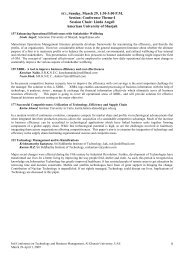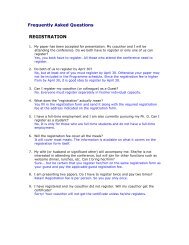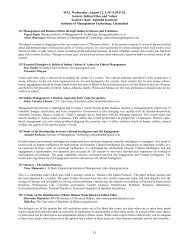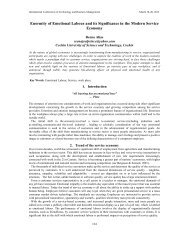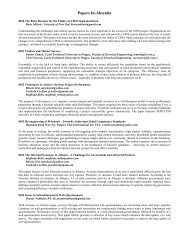Contributed Papers - Icmis.net
Contributed Papers - Icmis.net
Contributed Papers - Icmis.net
You also want an ePaper? Increase the reach of your titles
YUMPU automatically turns print PDFs into web optimized ePapers that Google loves.
Session: Indian Approach to Management Education<br />
Session Chair: Mohan Kotwal<br />
INDSEARCH<br />
8334 The Panch Tatva or Five Principles Approach to Management Education in 2020<br />
Mohan Kotwal, INDSEARCH, mohan.kotwal@rediffmail.com<br />
Visualizing Management Education Circa 2020 is a challenging task for all serious management educationists, pedagogists, and<br />
business scientists. Pancha Tatva approach is an exercise in evolving one such model based on the sound wisdom of the ancient<br />
Indian philosophy of ‘sa vidya ya vimuktaye’ or ‘education that liberates’. This model integrates the five essential elements<br />
necessary in creating business leaders who are humanists in their core but equally adept in being aware of the dynamic nature of<br />
doing business aimed not just at profits but in value addition to all stake holders.<br />
8355 Developing Karma-Yoga: An Indian Approach to Moral Development<br />
Zubin Mulla, Tata Institute of Social Sciences, zubinmulla@yahoo.co.in<br />
Venkat Krishnan, Great Lakes Institute of Management, venkatrkrishnan@ymail.com<br />
Business school education must include models for ethics and moral development rooted in the culture. We propose Karma-Yoga,<br />
the technique of intelligent action discussed in the Bhagawad Gita as an Indian model for moral development. Karma-Yoga is<br />
conceptualized as made up of three dimensions viz. duty-orientation, indifference to rewards, and equanimity. Based on survey<br />
results from 459 respondents from two large Indian organizations, we show that the dimensions of Karma-Yoga are related to<br />
moral sensitivity, moral motivation, and moral character.<br />
8411 Management: Vis-a-Vis Temporal & Spatial Global Development Holistically<br />
Vikas Arya, Institute of Management and Development, secretary_dbst@yahoo.in<br />
Simran Kaur, Institute of Management and Development, simranbharel@googlemail.com<br />
Dusyant Singh, Commercial Tax Dep. Uttarakhand, president_dbst@yahoo.in<br />
Management Education should make available Innovative, Lifelong Programs for livelihood improvement, Socially relevant<br />
education provision and established a Global Simulated Education Pattern for high-quality assurance by employing appropriate<br />
technologies to achieve Absolute Economy Transformation and Composite Global Development.Global Political Management<br />
(GPM): Green Politics with the Pace of Positive Global Change.Generation Management Tax:To make the Equal-Distribution of<br />
Flow of Money for Socio-Balance.Ethological management: Best Resources of Man, Power and energy.Space Management,<br />
Heritage Tax, Culture Management will be the Global Issues and Challenges for Future Management Education.<br />
8429 Moving beyond Spirituality and Exploring Religious Roots in Management Education<br />
Kumar Mukul, Entrepreneurship Development Institute of India, mukul.work@gmail.com<br />
K. Nagaraja Rao, Entrepreneurship Development Institute of India, nagaraja@ediindia.org><br />
Kumari Ruchi, Indian Institute of Management, kruchi@iimahd.er<strong>net</strong>.in<br />
The present study attempts to highlight the necessity of integrating the religious values without its dogmas to the management<br />
educational stream for making it more vibrant and holistic. It advocates the necessity of considering exemplary case studies of<br />
noble religious characters and incidents with lessons from various religions as teaching tools and drawing inferences for the<br />
present business problems. Without advocating any religious study it is possible to integrate the subjects of religion in the spiritual<br />
quotient for making a manager ‘Sthitha Pragna’ (one 'standing' (sthita) in 'wisdom' (prajna); a man of steadiness and calm, firm in<br />
judgement, contented).<br />
8484 Holistic Management Education - An Alternative Paradigm to Address Employability issue<br />
Suhas Chavan, Shri J.J.T.University, suhas_subal@yahoo.co.in<br />
While on one side the management education sector is working towards improving their curriculum and placement section to<br />
provide various job opportunities for their students, simultaneously they are also facing a new challenge of supplying quality<br />
talent to corporate. To cope up with this new challenge, this paper will explore a “Holistic Management Education” based on<br />
contemporary pedagogy used in Management education integrated with valuable know-how from ancient wisdom. This<br />
alternative paradigm will address the cause of employability and provide insights to develop student’s mindset in order to improve<br />
their performance in the wake of emerging challenges across corporate sector.



